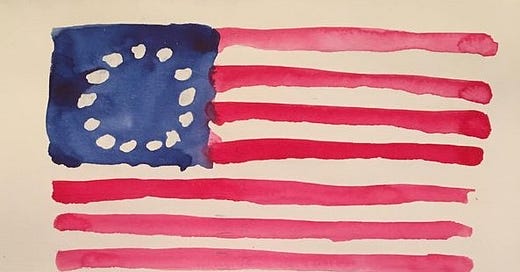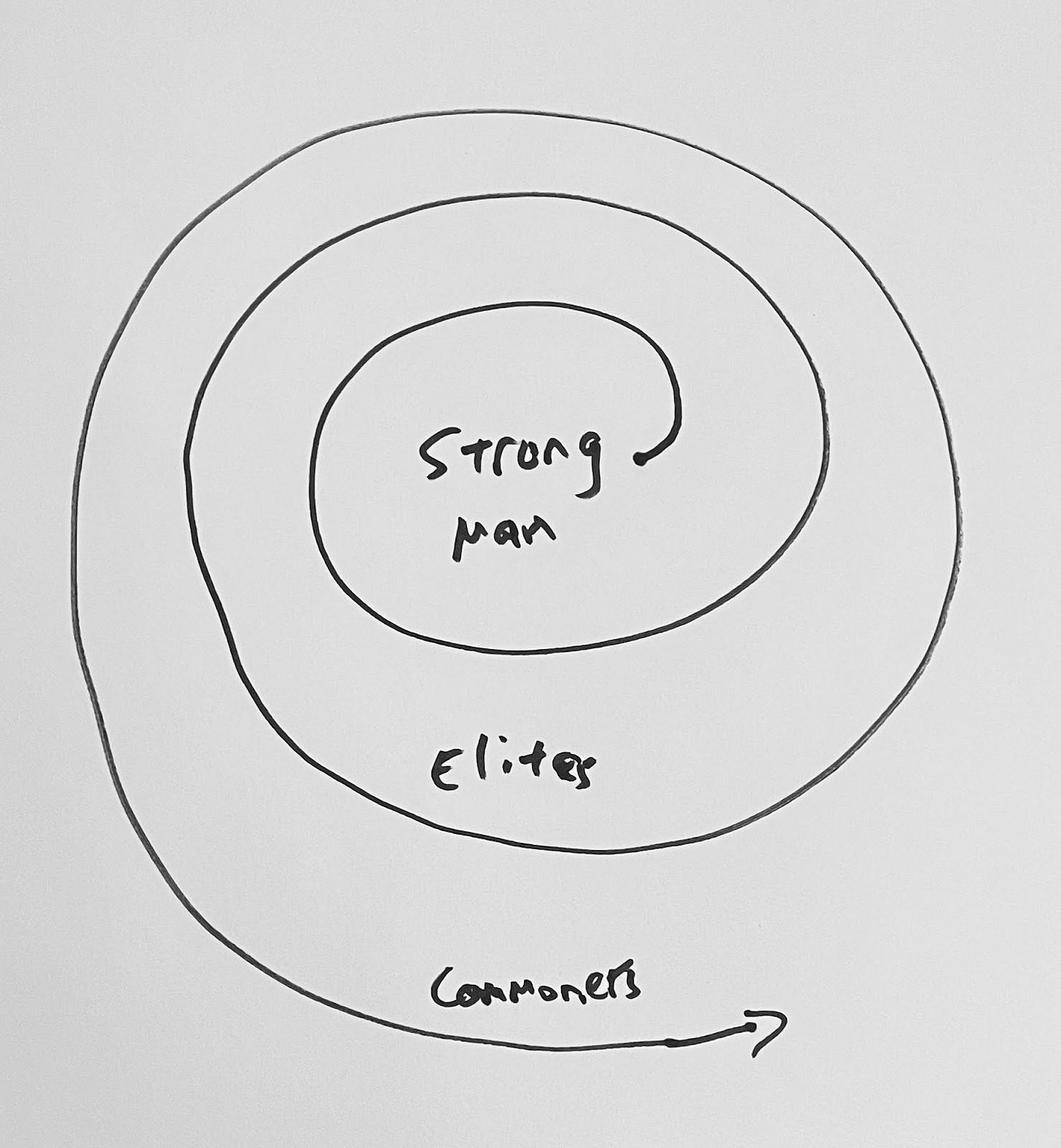For those of you who are fellow American citizens, I hope you took a moment on the 4th of July to appreciate the blessings we have to be members of this polity.
I made this little image back in 2019, I think maybe during my second year of daily art. A friend remembered it and asked me to repost it for the holiday. I stand by the caption that I penned in at the bottom. America is not a people, not a geography, and not a government. It is an idea, and an ideal.
Fascism is an idea based on a theory of “blood and soil” - meaning ethnic heritage linked to a geography. America is not that. Socialism is about government ownership of the means of production. America is not about that. The American ideal is based on the Enlightenment value of individualism, and radically so.
I would say America is not even really about being a republic or a democracy, though both of those facts are important. A republic is a form of government that is based on the rule of laws, not men. Democracy is a mechanism for selecting the representatives that will make the laws. Both republics and democracies existed before the United States of America did. Both form and mechanism date back thousands of years. Yet I would say America was first to embody them from an Enlightenment ideal, and the ideal of America emerged before the United States of America emerged.
Lately I have heard a number of podcasts where the person being interviewed is asked what book most influenced their thinking. I can name many, but perhaps none more than Violence and Social Orders by North, Wallace, and Weingast (NWW). The book’s project is to explain the history of human development, from primitive hunter-gatherer bands to modern democratic republics. Here’s the synopsis: modern humans emerged about 200,000 years ago. For most of that time, they lived in small, familial bands as hunter-gatherers, then toward the end, herders. Governance was based on who was the most effective at using violence. There were no laws, per se, only the rule of the strongest man. Where multiple strong men emerged, you might have elite competition, where the strong men tried to beat each other into submission, where one would emerge as the strongest. There was no real question of broad-based suffrage - the strongest man would rule. According to NWW, the strong men might agree to a truce, and promise not to attack each other, and promise to leave each other’s people and property alone so that each strong man could rule his claim. In the words of Aristotle, society went from rule by a tyrant to rule by an oligarchy. In both cases, society is subject to the rule of man, not the rule of laws. Commoners were subordinate to one of the elite strong men, and the strong man decided on matters of justice and how economic goods were distributed. The strong man used both justice and economic flows to maintain his position of power. The relationship between the respective strong men was based on detente - a balance of power. If a strong man senses that one of his counterpart strong men was weaker than he was, it was likely that the former would attack the latter and try to take his people and his stuff, so there was (and is) an incentive for all of the strong men to display a willingness and ability for violence at all times. So long as there was detente, society could prosper and grow. Elites acknowledged each other’s rights, but commoners had no rights. In the fine, hand-drawn diagram above, you can see the wind of rights starting with the individual strong man, then gradually winding outward to encompass the elites.
The first settled, human city emerged about 10,000 years ago. The form of governance would have been what NWW refer to as the basic state, or the closed-order state. The basic state consists of a strong man or a group of elite strong men, who have agreed to give each other rights to govern over their respective sub-groups. For NWW, the basic state is the default state. This is how humans naturally organize - under a strong man willing to use violence. The basic state is a closed social order because the elites govern all economic activity, and individuals cannot move across society, or in and out of society from or to other states without permission of the elites. The elites constantly use the threat of violence and the promise of economic access as a stick and carrot to maintain order among the commoners and amongst themselves. The key point about a basic state is that, however much things may be ultimately codified, the ultimate source of rule is the elite strong man or strong men. The vast majority of society has no voice in governance other than through the strong man they report up through. Basic states can become quite advanced and complex. Modern China and modern Russia are examples of advanced basic states. While the society itself is complex, every major decision ultimately roles up to Xi or Putin - the strongest of the strong men. It is through their elites that report up to them that they then govern their societies. Oligarchs (in Russia) or Party Leaders (in China) compete with each other in a Game of Thrones-like process to accrue power to themselves, while not angering the top strong man such that he takes their power.
Democratic governance emerged in places like Ancient Greece 2,500 years ago more or less, for periods of time. Common citizens were granted the right to a voice (vote) on matters of policy. But the outward expansion of suffrage was limited to citizens, which meant men, and often meant men of a certain means. We know the Greeks did not give women the vote, and there was a vast group of people living within the polity that did not have the vote, either, such as slaves. These societies, and many that followed them, such as Republican Rome, and the British Empire through the 18th century, were at the “doorstep” of transitioning to open access orders. They had written codes of law, but those codes were unevenly applied and deeply affected by social status (whether one was an elite or close to an elite). Eltes also used violence freely to resolve disputes between them in these societies.
The United States of America was the first open-access order, completing its transition, imperfectly, in the 19th century with the end of slavery, and then in the 20th century with women’s suffrage, and the formal end of Jim Crow. The winding of rights outward to include blacks and other marginalized races, then women, was a continuation of the graphic above. This process continues even today.
The process was made possible by Enlightenment values of individualism that the Founders embraced, as written in the Declaration of Independence:
We hold these truths to be self-evident, that all men are created equal, that they are endowed by their Creator with certain unalienable Rights, that among these are Life, Liberty and the pursuit of Happiness.--That to secure these rights, Governments are instituted among Men, deriving their just powers from the consent of the governed…
This idea, that all men are created equal, was a radical break with history. Historically it was commonly accepted that there were orders in society, and a natural hierarchy. One only needs to read Shakespeare or other older literature to see evidence of this belief as taken matter-of-factly. The idea that governments are instituted to protect these rights is also an Enlightenment creation. This idea does not arise from history. And the final idea that governments derive their power from the governed is also not from history. As already discussed, power in the basic state is derived from the threat of violence by the strong men, not consent from the commoners.
The early settlements of the lands that later became the United States were begun in a pre-Enlightenment period. Slavery was commonplace across the world and had always been part of human civilization. Hierarchies of social power based on relative status were not only informal, but formally enforced universally. Broad-based suffrage was unheard of. It is from this primordial ooze of human civilization that the Enlightenment ideas start to take hold. By the 18th century, they had captured the minds of the Founders, and we saw the American Revolution started based on these ideals. These ideals were then codified in the Constitution and the Bill of Rights.
America was the first open-access order. Although it took time, and although it is a work in progress, violence has been largely removed from the order of society. We no longer line up behind strong men to get our share of economic goods. Our rights as individuals are enshrined in the Constitution and protected by the courts. We continue to not only expand existing rights, but create new rights never before seen in human history.
The animating spirit of America is the spirit of the Enlightenment, not the pre-Enlightenment historical reality of caste systems, brutality, and exploitation. But when Jefferson wrote “all men are created equal” he really meant men - he was not using “men” to mean humans - he really meant men. And more specifically, he meant white, primarily wealthy men. There is a lot to dislike about that reality, but I think we have to judge Jefferson and the other Founders based on their starting point, which was a pre-Enlightenment perspective. They greatly expanded the wind of rights. But more importantly, whether they intended it or not, the results of their words and actions were to set the expanding winding of rights to expand and include radically larger portions of the population than ever before seen in history. And it is still a work in progress, which is important to remember. The outward expansion of inclusion continues. This is the beauty of America, the idea and the ideal. All men - meaning all humans - are created equal. That governments are instituted to preserve the rights of all humans. That the government is subordinate to the citizens. That government is a government of laws, not of strong men, to preserve freedom for all.
I don’t think it is possible to overstate the profundity of America in the history of humanity. America’s few hundred year history is a blink of an eye in the 200,000 years of humanity, but what a stunning change it has made. Some day the United States may fade as a state, as all states have a tendency to do, but I don’t think there is any undoing of America. America is not a people, not a geography, and not a government. It is an idea, and an ideal. It belongs to all humans, present and future.
God bless America!





